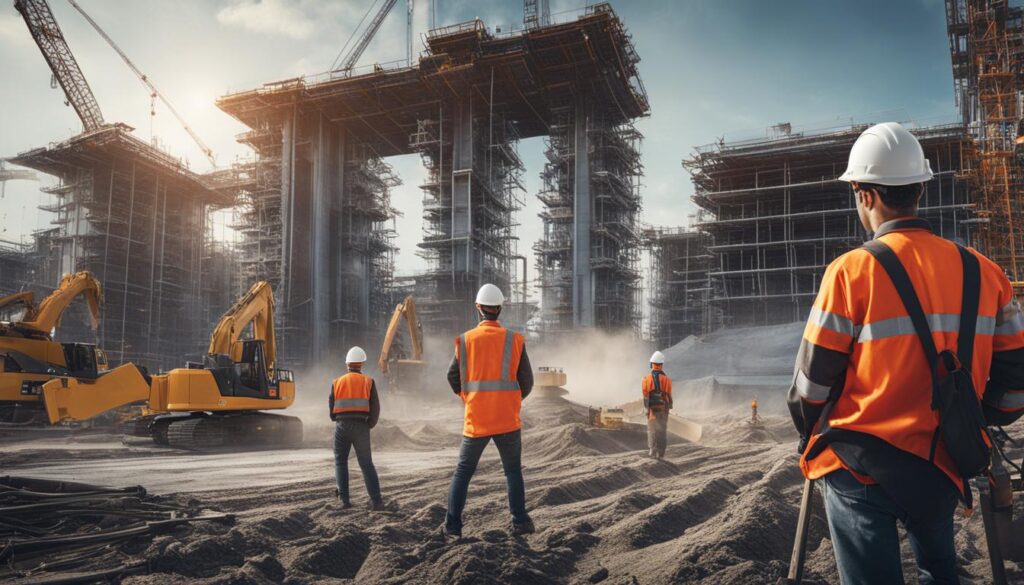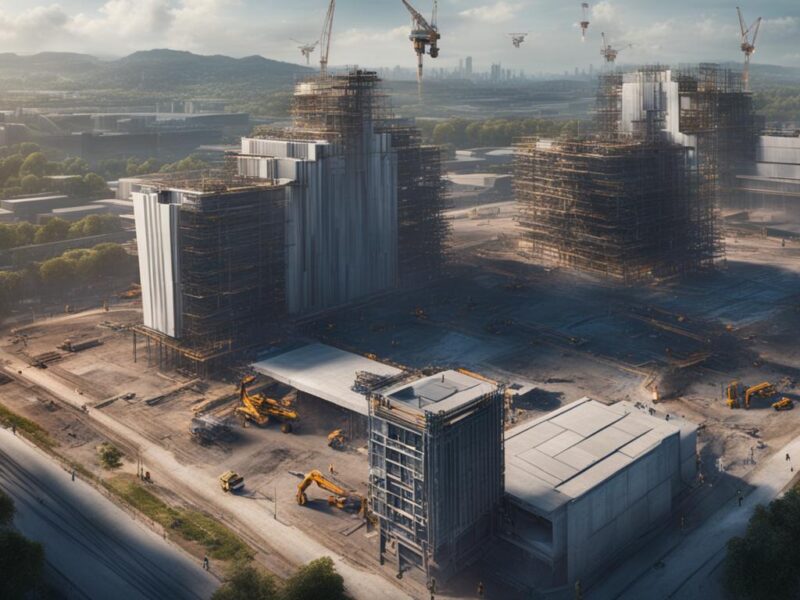
Cognitive Computing: Revolutionizing Project Management
The landscape of project management is in the midst of a significant transformation, particularly within the realm of construction. Efficacy and efficiency are at the forefront of this revolution, with cognitive computing in project management construction leading the charge. By integrating artificial intelligence in construction projects, project managers are experiencing an unparalleled evolution in how they orchestrate and execute complex projects.
Data is the new bedrock upon which project management now stands, and data-driven decision making in project management is bolstering the predictability and success of construction outcomes. From automating mundane administrative tasks to providing sophisticated decision-making frameworks, AI enhances the entire project lifecycle. Embracing these cognitive technologies is not merely an option but a critical step for construction industries aiming to thrive in the modern digital era.
Key Takeaways
- Cognitive computing is significantly enhancing project management in the construction industry.
- Artificial intelligence empowers managers to streamline project tasks for better outcomes.
- Data-driven practices in project management lead to accurate predictions and risk management.
- Adopting AI in construction projects helps optimize resource allocation and stakeholder engagement.
- For construction professionals, staying updated with the latest AI developments is vital.
Integrating AI and Project Management: A Synergistic Relationship
The advent of AI in the field of project management signifies far more than a technological upgrade; it heralds a synergistic convergence that is redefining industry standards. By bringing cognitive automation in project management to the forefront, AI is not merely a supplementary tool but a transformative force, reshaping the fabric of effective management within the construction sector.
The Role of AI in Enhancing Project Management Tools
Today’s project management tools are interwoven with AI solutions for construction project scheduling, elevating the intricacies of project coordination to optimal precision. These tools, equipped with machine learning for construction project management, surpass traditional capabilities by analyzing large datasets, optimizing schedules, and foreseeing potential hurdles with remarkable accuracy.
Advancements in Automated Task Management
Gone are the days when project managers were bogged down by the drudgery of routine tasks. The progress in automated task management, underpinned by AI, liberates them from such tasks. From generating progress reports to maintaining meticulous records, AI streamlines these processes with an efficiency that is unattainable by human hands alone.
Cognitive Automation: Shifting from Menial to Strategic Tasks
In the tapestry of project management, cognitive automation represents a shift from menial tasks to a robust strategic focus. By delegating lower-level tasks to AI-powered systems, project managers can now concentrate on higher-value strategic planning and critical decision-making. This not only refines the planning process but also significantly enhances the tactical execution of each project phase.
This evolution within project management is indicative of the potential and power inherent in the integration of AI, transcending its role as a technological asset into a partner in strategic thinking. For those eager to stay ahead of the curve in this AI-augmented domain,
Cognitive Computing in Project Management Construction
At the intersection of technology and efficiency, advanced analytics in construction management are playing a groundbreaking role. Project managers in the construction industry are increasingly relying on cognitive technologies for construction project planning, steering the sector away from gut feeling to a more reliable, evidence-based approach. These technologies are critical in processing and analyzing the extensive and complex data inherent to construction projects, providing insights that were once inaccessible.
One of the most significant advantages brought forward by cognitive computing is the high degree of precision in resource forecasting and document management. Unlike traditional methods, which could be prone to human error, AI technologies apply their computational power to predict project needs with much higher accuracy. The ability to anticipate demands not only streamlines the allocation of materials and labor but also allows companies to slash unnecessary overheads through more optimized resource management.
- Introduction of cognitive computing in project management optimizes efficiency.
- Advanced analytics pave the way for a data-driven construction industry.
- AI tools extend beyond analytics to anticipate human resource needs.
- Shift from intuition-based to data-centric decision-making in construction projects.
- Project managers gain an enhanced understanding of project dynamics through data analytics.
The proliferation of data in recent years is undeniable, and the construction industry is no exception. AI capabilities in project management harness advanced analytics to sift through extensive datasets, revealing trends and providing managers with the ability to make informed decisions quickly and with confidence. The adaptation of these emerging technologies is not just the way forward — it’s a transformation that’s happening now.
| Traditional Project Management | Cognitive Computing Approach |
|---|---|
| Intuition based decision-making | Data-driven decision-making |
| Limited data analysis capacity | High processing power for complex data sets |
| Resource forecasting based on past experiences | Predictive analytics for accurate resource forecasting |
| Manual document management and tracking | Automated, AI-driven document categorization and retrieval |
| Reactive response to project variables | Proactive adaptation through real-time data insights |
Those in the construction sector who recognize the shift in tides are swiftly adopting cognitive computing technologies. Companies can not only achieve greater fiscal prudence but also improve the speed and accuracy of project planning and execution. For those who aim to lead in this realm, staying informed of the latest trends and insights is essential.
AI Solutions: Transforming Construction Project Scheduling
The integration of AI solutions for construction project scheduling has ushered in a new vista of capabilities that optimize complex project timelines. As machine learning converges with construction project management, the once arduous task of scheduling is now an arena of precision and strategic foresight, making significant strides towards more cost-effective and timely project completions.

Intelligent Scheduling Systems Driven by AI
Intelligent scheduling systems, powered by AI, transcend traditional scheduling methods by utilizing vast amounts of data to make highly accurate predictions about project timelines. With these AI-embedded systems, project managers can detect possible delays before they occur, allocate resources more efficiently, and adjust workflows dynamically to meet project demands.
Machine Learning’s Impact on Efficiency and Precision in Construction
Machine learning algorithms enhance the efficiency and precision with which construction projects are managed. By analyzing historical performance and current project data, these algorithms can provide a blueprint for optimizing the allocation of labor and resources. The agility imparted by machine learning algorithms in deciphering project data ensures that construction management is an exercise in proactive, rather than reactive, decision-making.
| Aspect of Scheduling | Traditional Approach | AI Enhanced Method |
|---|---|---|
| Project Timeline Prediction | Based on experience and simple tools | Driven by predictive analytics for higher accuracy |
| Workflow Optimization | Mostly manual adjustments | Dynamic adaptation to real-time data |
| Resource Management | Static allocation based on estimates | Responsive allocation based on algorithmic analysis |
| Task Dependencies | Identified through manual planning | Automatically forecasted by AI systems |
| Efficiency | Variable, dependent on human oversight | Consistently optimized with machine precision |
From Data Overload to Data-Driven Decision Making
The cascade of information flooding the construction industry presents a challenge and an opportunity. Project managers are finding solace in advanced analytics in construction management, which transform vast data pools into well-springs of actionable insight. In an era where data-driven decision making in project management is not just a buzzword but a necessity, managers are turning the overdose of data into a powerful ally for project transparency, agility, and accountability.
By embracing a data-centric management ethos, the modern project manager thrives amidst this sea of data, navigating through complexities with an informed clarity and prescient vision. The tools and systems at their disposal leverage the relentless computational power of AI, carving pathways through data jungles with precision and delivering strategic vantage points that illuminate the road ahead.
Leveraging Advanced Analytics for Better Outcomes
Project management has transcended gut-driven gambles into a realm where advanced analytics shine a guiding light. AI tools are the sophisticated companions of today’s construction managers, empowering them to unearth trends, predict project flow fluctuations, and optimize resources. Every decision becomes an informed strategy, especially as global data volume is projected to leap from 79.4 zettabytes in 2021 to an astounding 181 zettabytes by 2025. It is within this milieu that project managers, armed with analytics, transform the potential paralysis of data overload into decisive mastery.
Embracing a Data Centric Approach in Project Management
The transformational impact of a data-centric approach extends through all limbs of project management. Evolutionary AI tools do not simply report; they assess, analyze, predict, and prescribe. This proficiency to distill pertinent information from the overwhelming data enables project managers to keep a real-time pulse on project health, reassessing and reorienting strategies to align with fresh, data-induced insights.
For professionals keen on cementing their role at the vanguard of the construction industry’s future, Modular Pulse stands as a beacon.
| Data Point | Impact on Project Management |
|---|---|
| Volume of Data | Ability to manage larger datasets effectively |
| Analytical Capabilities | Uncover trends and predict outcomes with sharper precision |
| Real-Time Data Access | Foster dynamic project adjustments and deliver agility |
| Resource Optimization | Strategic allocation of labor and materials |
| Decision Making Framework | Transform reactive approaches into proactive strategies |
Artificial Intelligence in Construction Projects: A New Frontier
The incorporation of artificial intelligence in construction projects marks a transformative chapter for the industry. By streamlining complex management tasks through automation in construction project risk management, AI is setting a new benchmark for excellence, efficiency, and efficacy. These advancements are not confined to just one facet of project management, but span across its entirety, introducing remarkable improvements in every step of the operation.
Utilizing AI’s sophisticated predictive abilities, construction project managers can effectively foresee and prevent potential barriers. This proactive approach to managing risks enables swift, strategic responses, greatly reducing the probability of project delays and financial overshoots. Automation magnifies the scope of what managers can achieve, reallocating precious time from routine tasks to strategic planning and high-level decision making.
| Construction Project Aspect | Traditional Approach | AI-Driven Method |
|---|---|---|
| Task Management | Manual handling of tasks | Automated task completion and scheduling |
| Risk Management | Reactive; based on reports and hindsight | Proactive; predictive insights to mitigate risks |
| Resource Allocation | Based on estimates and experience | Dynamic and data-driven allocation |
| Project Scheduling | Dependent on manual planning | Optimized by AI for greater accuracy |
| Cost Management | Often overrun due to unforeseen events | Kept in check by predictive budget forecasts |
As Gartner predicts a future where 80% of project management tasks will be influenced by AI by the year 2030, the trajectory for construction project management is clear. This anticipated shift underscores the potential for unprecedented growth and the ability of construction projects to adapt to an ever-changing landscape of opportunities and challenges.
For those within the construction sector eager to harness the disruptive power of AI and automation, resources such as Modular Pulse emerge as navigational beacons. Offering a deep dive into the latest in construction technology, subscribing to this newsletter is a strategic move for professionals aiming to stay at the pinnacle of industry innovation.
To explore the myriad ways AI is redefining construction project management and for more insightful analysis, subscribe for free at Modular Pulse, and join the community of forward-thinkers who are shaping the future of the construction industry.
The Human Factor in AI Project Management
As the tide of cognitive automation in project management and artificial intelligence in construction projects surges forward, a narrative of human-AI collaboration emerges. The integration of sophisticated technologies does not overshadow the need for human insight; rather, it demands a thoughtful synergy between the two.
Balancing AI Capabilities with Human Insight
In the seamless melding of AI with the intricacies of project management, human wisdom serves as the cornerstone. While AI excels in processing vast amounts of data and performing advanced calculations, it relies on the keen understanding and situational awareness that only humans possess. Project managers must deftly navigate the intersection of high-tech AI capabilities with their own deep-seated knowledge—a dance between numerical precision and human judgement.
AI as an Augmentative Tool, Not a Replacement
AI’s role in the future of project management is undoubtedly transformative, yet it is not that of a usurper. It is an augmentative force, created to enrich the craft rather than replace the human element at its core. The nuance of human behavior, the flux of contextual variables, and the artistry of management—the AI cannot grasp these alone. It is precisely these subtleties that position project managers as irreplaceable strategists in the AI-driven epoch.
The conquest of cognitive automation in project management brings to light potential biases and the complexity of integrating AI within established processes. However, it is the project manager, equipped with innate understanding, who wields AI as a powerful ally rather than an autonomous sovereign. The resonance of human touch within the matrix of algorithms endows project delivery with a dynamic that is undeniably human.
Enhancing Communication and Collaboration with Cognitive Technologies
Embracing the digital revolution, cognitive technologies for construction project planning are finding their niche within the complex webs of project management. As these technologies proliferate, the dynamics of team interaction and stakeholder communication are experiencing a renaissance. Enhanced connectivity, fueled by machine learning for construction project management, bridges the physical and digital divide, fostering a cohesive, collaborative environment integral to modern construction projects.
Virtual Assistants and Chatbots for Enhanced Stakeholder Engagement
Virtual assistants and chatbots, underpinned by sophisticated cognitive technologies, are redefining stakeholder interaction. These AI-driven platforms provide stakeholders with instant access to project information, facilitating an uninterrupted engagement channel. By managing routine inquiries and updates with effortless automation, they preserve project managers’ invaluable time, allowing them to channel their focus towards strategic objectives that demand human expertise.
Breaking Barriers: AI-Powered Collaboration Tools
The introduction of AI-powered collaboration tools heralds an era where location barriers dissipate, enabling seamless project alignment and oversight. Even as teams scatter across different locales, these tools synchronize efforts, ensuring that each member’s contribution bolsters the project’s unified vision. Moreover, these technologies bolster inclusivity, inviting a diverse conglomeration of talents to contribute from anywhere in the world, securely and efficiently.
| Features | Benefits | Impact on Construction Project Management |
|---|---|---|
| Real-Time Communication | Instantaneous dialogue and updates | Facilitates timely decision-making and issue resolution |
| Digital Collaboration Platforms | Enhanced teamwork and project visibility | Improves project alignment and reduces miscommunication |
| Remote Work Accommodation | Flexibility and work-life balance | Attracts a broader talent pool and increases employee satisfaction |
| Inclusivity | Engages diverse perspectives | Enriches problem-solving with varied insights |
| Security and Compliance | Protected communication channels | Strengthens trust and maintains project integrity |
As construction project management continues to evolve, the impetus to integrate these cognitive tools grows ever stronger. They are not passive additions but active enhancers that magnify a project’s capacity for success. For construction professionals ready to leverage these advancements, resources such as Modular Pulse are invaluable. To discover more about leveraging technological trends for construction project management, subscribe for free to Modular Pulse.
Data-Intensive Project Planning Optimized by Cognitive Computing
In today’s construction landscape, where every decision can result in significant impacts, cognitive computing in project management construction provides a clarion call for precision and strategic foresight. As project planning becomes increasingly data-intensive, cognitive technologies for construction project planning are proving essential for navigating complexity with grace and intelligence.
Cognitive Technologies for Construction Project Planning
The digital transformation in the field of construction project management leans heavily on the advanced capabilities of cognitive computing. These technologies interpret complex data patterns, guiding project managers to forecasts that are deeply rooted in data rather than conjecture. Consequently, cognitive technologies for construction project planning ensure that project timelines, budgets, and resources are balanced optimally, reflecting a sound integration of past experiences with real-time data.
The Future of Resource Forecasting and Allocation
Resource forecasting and allocation have been overhauled in this technological era — with AI’s predictive analytics leading the march forward. Utilizing extensive historical data trends and current project needs, AI systems evaluate and anticipate the need for future resources. This transformative approach promotes an agile response to demand fluctuations, underscoring cognitive computing’s invaluable role in project management construction and setting a progressive industry standard.
| Project Planning Element | Traditional Approach | AI-Powered Method |
|---|---|---|
| Data Interpretation | Manual and error-prone | Automated for accuracy and depth |
| Decision-Making | Gut feeling and guesswork | Data-driven and evidence-based |
| Resource Allocation | Based on past experiences | Dynamic, based on predictive analytics |
| Scheduling | Static and inflexible timelines | Adaptive to project shift with AI |
| Cost Estimation | Rough estimates | Refined predictions reducing overheads |
The shift towards a cognitive computing framework in construction project management allows for an unprecedented level of project planning acumen. Leveraging the intelligence and reach of such technologies facilitates forward-thinking strategies that are aligned with both current needs and future projections. This marks a radical departure from traditional methodologies, advancing the domain of project management into a new epoch defined by AI-enhanced operational excellence.
Risk Management: An Automated, Predictive Approach
The domain of risk management within the construction arena has experienced a seismic shift, thanks to the integration of automation in construction project risk management. Where once managers relied on manual evaluation and forecasting, machine learning for construction project management has implanted a system of precognition—turning potential setbacks into well-charted waters.

Contemporary AI models wield the capacity to sift through mountains of historical data, discerning otherwise indistinct affinities. Their analytic prowess is honed further by continuous learning, refining their predictive accuracy with each project cycle. Automated systems become the watchmen for the unforeseeable, presenting leaders with a dashboard of foresight to navigate through the intricacies of project risk.
These intelligent applications assess a myriad of variables—from environmental conditions to market volatility—to present a comprehensive risk panorama. With incisive algorithms, the technology anticipates hazards, crafts contingency plans, and erects an invisible bulwark against project disruption.
| Risk Aspect | Manual Management Approach | AI-Enhanced Predictive Approach |
|---|---|---|
| Forecasting | Reliant on experience and historic records | Utilizes real-time data and trends for high-accuracy forecasts |
| Decision Speed | Delayed by data gathering and processing | Instantaneous, backed by automated computations |
| Impact Analysis | Subjective assessment | Objective, quantified impact predictions based on multifaceted data |
| Response Plan | Generic and reactive strategies | Customized and proactive response tactics |
| Risk Mitigation | Can be haphazard and unstructured | Systematic, strategic risk reduction harnessing advanced modeling |
Herein lies the genius of AI’s role in risk management. It empowers leaders to preemptively address project threats before their manifestation—optimizing operational safety and continuity. This technologically fortified stratagem holds the promise of a construction industry that is robust, agile, and resilient.
For construction professionals keen to align themselves with the breakthroughs of AI in project management, Modular Pulse stands as the sentinel of such knowledge. To receive incisive updates on how AI transforms project risks into mastered variables, subscribe for free at https://modularpulse.com/subscribe/.
Conclusion: Cognitive Computing as the Catalyst for Construction Project Management Innovation
The epoch-making alliance of cognitive computing in project management construction and AI solutions for construction project scheduling is defining the modern edifice of the construction industry. The strategic application of AI is not only automating tedious tasks but also sharpening the acumen of data-driven decision-making. These technologies together are forming a new bedrock for project success, imparting wisdom from predictive analytics that once seemed the stuff of science fiction. Project completion timelines now bear the hallmark of precision and efficiency, outcomes of this digital coup d’état within the domain of construction management.
In constructing the future, project managers are selectively harnessing AI insights, recognizing that the value of AI is magnified when paired with human intellect. The harmonious interplay between AI’s analytical might and human intuition cultivates a fertile ground for progress that respects the precision of technology without neglecting the nuances recognized by human experience. This elegant synchronization ensures that the storyboard of project management unfolds with greater predictiveness, productivity, and adaptability, setting the scene for a future-proof construction industry.
For those professionals and thought leaders eager to remain at the vanguard of this transformation, Modular Pulse—a construction technology newsletter—is the compass pointing towards the horizon. Those who subscribe for free gain access to a trove of knowledge that navigates through the vast terrain of cognitive computing in project management. It’s more than just information; it’s intel that could drive the next breakthrough in your project’s success story.
FAQ
How is cognitive computing transforming project management in construction?
Cognitive computing is transforming project management in construction by streamlining administrative tasks, improving decision-making with data-driven insights, and predicting project pathways and risks. It leverages AI and machine learning to analyze large datasets, enhance resource allocation, and automate routine management tasks.
What synergistic relationship exists between AI and project management?
AI augments project management by automating tedious tasks and enabling project managers to focus on strategic planning. By providing predictive analytics and intelligent scheduling, AI works in tandem with human managers to optimize project outcomes and efficiency.
How does automated task management benefit construction projects?
Automated task management offloads routine duties such as data entry and status reporting to AI-powered systems. This frees up project managers to devote more time to critical planning and oversight, enhancing productivity and project success.
In what ways has machine learning impacted construction project management?
Machine learning has significantly impacted construction project management by improving the precision of scheduling and resource allocation, predicting potential delays, and auto-generating attainable work schedules based on historical performance and variable analysis.
Can advanced analytics help manage the vast amount of data in construction projects?
Yes, advanced analytics can process the large volumes of data in construction projects, enabling project managers to convert this information into actionable insights, uncover trends, predict risks, and optimize resources, turning potential data overload into a strategic advantage.
What is the role of AI in construction project risk management?
AI plays a crucial role in construction project risk management by forecasting potential risks and providing early warnings, allowing for preemptive action to mitigate issues. AI-driven models analyze data to predict and proactively address potential project risks.
Why is the human factor still important in AI-based project management?
While AI excels at data processing and complex calculations, the human factor is vital for providing nuanced understanding and contextual decision-making that AI cannot fully replicate. Human expertise is necessary to guide AI’s analytical capabilities and ensure a balanced, insightful approach to project management.
How do cognitive technologies enhance communication and collaboration in project management?
Cognitive technologies, like virtual assistants and AI-powered collaboration tools, improve communication by handling routine inquiries and aligning distributed teams. They aid project managers in maintaining project oversight, ensuring alignment and fostering team cohesion, even in remote working environments.
What advances in project planning have cognitive technologies made possible?
Cognitive technologies have advanced project planning by enabling more accurate forecasting and allocation of resources. AI’s predictive analytics and modeling capabilities remove guesswork from project planning, leading to more strategic and dynamic management processes.
How has AI changed the approach to risk management in construction?
AI has revolutionized risk management by using predictive tools to evaluate potential risks, considering historical data and external variables. This allows for the development of proactive mitigation strategies and the implementation of secure operational frameworks for construction projects.
Source Links
- https://www.linkedin.com/pulse/five-project-management-trends-2024-barry-goldberg-vxobe
- https://www.grazitti.com/blog/revolutionizing-project-management-the-impact-of-ai-and-human-collaboration/
- https://www.monitask.com/en/blog/the-role-of-artificial-intelligence-in-improving-project-management-how-ai-can-help-make-projects-run-smoothly







